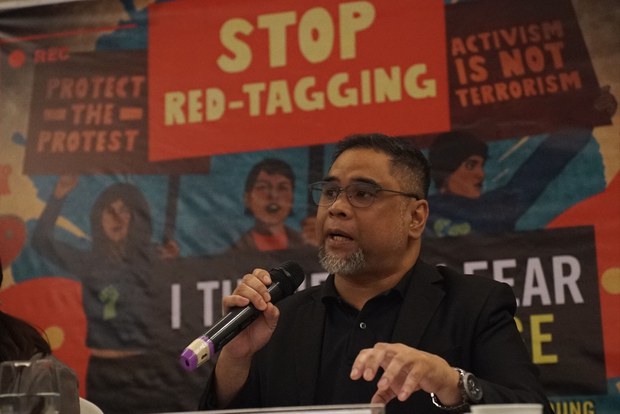Under Marcos, Philippines still using Facebook to ‘red-tag’ young activists: Amnesty International
2024.10.14
Manila
 Wilnor Papa, Amnesty International’s advocacy and mobilization manager in the Philippines, gestures as he talks with journalists about how Philippine authorities have used Facebook to go after young activists, during a press conference in Manila, Oct. 14, 2024.
Wilnor Papa, Amnesty International’s advocacy and mobilization manager in the Philippines, gestures as he talks with journalists about how Philippine authorities have used Facebook to go after young activists, during a press conference in Manila, Oct. 14, 2024.
Philippine security and intelligence authorities are still using Facebook under the Marcos administration to brand young activists as having suspected ties to communist rebels, Amnesty International said in a report Monday.
Administrations led by President Ferdinand Marcos Jr. and his predecessor, Rodrigo Duterte, have both used social media platforms as weapons to go after Filipino activists by linking them to the outlawed Philippine communists through so-called “red-tagging,” although Marcos had promised to respect human rights, Amnesty alleged.
“[T]he increased targeting of young human rights defenders under the presidencies of [Duterte] and [Marcos] is deliberately attempting to silence critical voices,” Amnesty said in its report.
“Young people have historically played a crucial role in mobilizing people’s movements against repressive forces, and they continue to do so, albeit amidst ever greater threats to their right to freedom of expression, their health and their liberty and security.”
The London-based human rights watchdog group called on Philippine authorities to stop the “red-tagging” campaign, repeal an anti-terror law that Amnesty said was also being used against activists and dissenters, and cease any attacks or harassment against Filipino rights activists.
Amnesty also urged Meta, Facebook’s parent company, to “conduct a thorough review and overhaul of its human rights due diligence processes, to ensure that it adequately scrutinizes ‘red-tagging’ posts flagged by human rights defenders and to eliminate paid ‘red-tagging’ content before promoting it to users of its platform.”
The Philippine government and Meta, Facebook’s parent company, did not immediately respond to BenarNews requests for comment about the Amnesty report.
“Red-tagging” is a practice used among Philippine military and police personnel to accuse individual people or groups of being members or sympathizers of the communist New People’s Army (NPA), which has been waging a rebellion since 1969.
RELATED STORIES
US govt report: Human rights abuses continue in Philippines under Marcos
UN expert calls on Philippines to abolish anti-communist task force
Philippine environmentalist groups raise alarm about abduction of 2 activists
Rights group slams Philippine govt for ‘red-tagging’ activists
A multi-pronged government campaign to “red-tag” activists “has in turn allowed state actors to legitimize further serious human rights violations against young activists, including arbitrary arrests and enforced disappearances,” Amnesty said.
While Facebook prohibits “red-tagging,” Amnesty said it had found evidence of the platform’s failures in due diligence when it comes to human rights risks.
“Inadequate content moderation and ad approval mechanisms, and a failure to track the effectiveness of its risk mitigation measures, have turned Facebook into an enabling environment that contributes to serious human rights violations,” Wilnor Papa, head of the activism and mobilization at the Philippines chapter of Amnesty International, told reporters in Manila on Monday.
Facebook is the top social media platform in the Philippines, with over 83 million Filipino users currently, according to estimates.
“Contrary to President Marcos’ attempts to portray his administration as more rights-respecting than his predecessor’s government, ‘red-tagging’ remains common,”Amnesty said.
In the first half of the year, there were more than 450 “red-tagging” incidents, 61% of which were attributed to government actors, its report said, citing a study by the Ateneo Human Rights Center.
Amnesty cited the case of human rights advocate Hailey Pecayo who said she had been “red-tagged” by the military in August 2022. At the time, she was 19 years old and investigating a case in which members of the security forces were accused of killing a minor.
Pecayo faced criminal complaints from the military, including allegations of terrorist acts and attempted murder. She also told Amnesty that a military officer had sexually harassed her.
“[I]t’s traumatic. It’s not a normal thing to be facing at our age,” she told Amnesty International.
Prosecutors dismissed the criminal complaints against her in 2023, but Pecayo reported that the harassment, online impersonation and threats continued in 2024. These included Facebook posts from troll accounts with pictures of her embedded in posts stating that “terrorists” like her deserve to die, the Amnesty report said.







